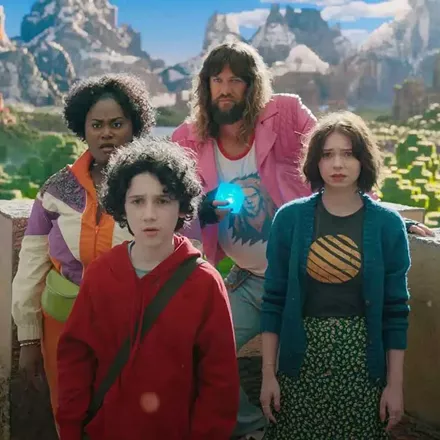Feature movie review: WONKA
Charming family fun is blunted by insisting that this is a prequel
By Scott Renshaw @scottrenshawBefore a single image from the actual movie Wonka appears on screen, director Paul King sets a stage that I'm not convinced should have been set. A few tinkling notes emerge on the soundtrack, from the song "Pure Imagination"—one of the Anthony Newley/Leslie Bricusse tunes featured on the soundtrack of the 1971 classic Willie Wonka and the Chocolate Factory, the song that accompanies our first look at the candy-filled central room. This Willie Wonka, those notes inform us, isn't just any Willie Wonka, not some completely distinct interpretation of the Roald Dahl character like the one in Tim Burton's 2005 Charlie and the Chocolate Factory. This Willie Wonka is Gene Wilder's Willie Wonka—younger, sure, but a younger version of that guy.
And I simply do not buy it, not for a single solitary second.
It bears saying before progressing too much farther that director Paul King's Wonka is a perfectly enjoyable piece of family-friendly cinema, full of energy and some lively enough tunes as crafted by Irish songwriter Neil Hannon for the musical production numbers. The same zippy charm that King brought to his two well-loved Paddington features is on full display, without collapsing into the excesses of so much IP-driven Hollywood movie-making. But this is a movie that lays its foundation as part of a specific chain of events that will eventually result in Wilder's Wonka tumbling his way to the front gates as he invites Golden Ticket-winning children into a tour of his wondrous factory. Which, at the risk of repeating myself, is a mistake.
That foundation introduces us to young Willie (Timothée Chalamet) as he prepares to put his years of globe-trotting study of candy-making to use, landing in an unnamed but vaguely European town. There he hopes to set up shop as a chocolatier, but many obstacles stand in his way, from an inadvertent agreement to indentured servitude at the hands of a nasty laundress (Olivia Colman), to the manipulations of the chief of police (Keegan-Michael Key) by the local candy cartel run by Slugworth (Paterson Joseph), Fickelgruber (Mathew Baynton) and Prodnose (Matt Lucas).
There's a lot going on as the story unfolds, including Willie's growing friendship with his fellow involuntary laundry workers like the young orphan Noodle (Calah Lane), and his conflict with a justice-seeking Oompa Loompa (a digitally diminished Hugh Grant). Mostly, though, Wonka avoids feeling over-stuffed, thanks to King's light touch and a breezy pacing through even the most expository scenes, like the flashback to Willie's childhood relationship with his mother (Sally Hawkins). The supporting performances similarly walk a delicate line, evoking the exaggerated types required of this kind of fantasy without falling into over-the-top grotesquerie which would have weighed the whole enterprise down.
Chalamet's Willie, on the other hand, presents a different problem. There's nothing wrong conceptually with suggesting a more naïve confectionary wizard-in-the-making, though the boat that this character is fresh off of—having spent years as an explorer—might tend to make someone a bit more worldly than this Willie seems. But the attempts to craft Willie as a sympathetic, innocent figure, including making him illiterate when we first meet him, blunt the mischievous edge that made Wilder's 1971 version of the character so indelible. Chalamet might bring plenty of showmanship to his performance, giving his all to being a song-and-dance man, but the screenplay—by King and his Paddington 2 collaborator Simon Farnaby—asks him to play someone who is simply too nice to be at all believable as a future genial madman.
Once again, to be excruciatingly clear: A different concept of Willie Wonka isn't inherently problematic, unless you're making a deliberate effort to connect your version with that previous version. When Grant breaks into the "Oompa Loompa" song, it's a specific callback that works because we know it's connected to a finger-wagging lesson. And you can't have it both ways, which is what Wonka wants. In this film's scene where Willie first opens up his elaborately-appointed shop to customers, it's a lovely and light-hearted moment that gets its very own original song. Perhaps that's the vibe King should have stuck with, instead of cuing his audience with "Pure Imagination" that what we're expected to imagine is a prequel.
More by Scott Renshaw
-
Comedian Steve Hofstetter interview
Veteran standup talks about getting started, dealing with hecklers, and learning a valuable lesson in SLC
- Apr 11, 2025
-
Film Reviews: New Releases for April 11
The Amateur, Drop, The Ballad of Wallis Island, Warfare, King of Kings, Sacramento
- Apr 10, 2025
-
Movie reviews: THE BALLAD OF WALLIS ISLAND, WARFARE, THE KING OF KINGS
Wars of words, weapons and ideas drive three new theatrical releases
- Apr 9, 2025
- More »
Latest in Film Reviews
Readers also liked…
-
Sundance 2025 wrap-up plus February special screenings
Uncertainty about the future location shifts focus away from the movies
- Feb 5, 2025









